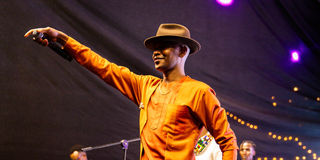
Mugiithi artist, Samuel Muchoki aka Samidoh performing at a past Ngemi Festival.
If you are on TikTok, you must have seen clips from the electrifying Ngemi Homecoming Festival.
And if you were around Limuru last weekend, you probably found yourself stuck in traffic as Gen Z and millennials flocked to one of the biggest cultural events of the year, the Ngemi Festival.
Ngemi, which means ‘ululation’ in Kikuyu, is more than an event; it is an experience.
The Ngemi Homecoming Festival was held at Eva's Garden Redhill Limuru and featured Wanjiine, Ayrosh, Wacuka, Folk Fusion and a surprise performance by Mugiithi maestro Samuel Muchoki aka Samidoh. It was hosted by Kikuyu comedian Auntie Jemimah.
Curated by three friends, one of whom insists on being identified simply as Njoki, the organisers told Nation.Africa the festival has grown into a cultural movement in less than a year.
"We started Ngemi on August 17, 2024,” Njoki says.
"This was our third edition and we are only seven months old. The demand is crazy. We didn't plan for so many editions so soon, but people keep asking for more, so we deliver."
Njoki says she runs an events company and has extensive experience in corporate and social event planning.
Toolbox Entertainment Limited, where she works, provided the stage, sound, lighting and screens for Ngemi.
"We have grown from small weddings and funerals to large corporate events. That journey has shaped us," she reflects.
But why Ngemi? Why not a simpler, more commercial approach?
"Ngemi is not an event first and foremost, it's an experience. It is a celebration of art, music, food and culture. The name comes from the five traditional ululations, blessings given to Kikuyu children. It is a homecoming, a return to our roots. That was the whole idea.
Njoki says her journey reflects this cultural reawakening.
"I grew up as a born-again Christian, serving in the church. Everything Kikuyu felt wrong, almost sinful. But Ngemi is part of a wider spiritual awakening taking place across Africa. People are questioning what the colonisers taught us and trying to understand who we were before. What did we eat? How did we speak? What was our art like? Since we can't travel back in time, we are reviving our culture by celebrating what we remember, and that is our food, language and music," she explains.

Revellers having fun at the Ngemi Festival event.
The first Ngemi event attracted over a thousand people, a mix of Generation Z and millennials.
"Most young urban Kikuyus only have their names and a vague knowledge that their roots are in Murang'a or Kiambu. Many don't even speak the language. We saw this hunger on social media and knew we had an opportunity to create something meaningful.
According to Njoki, TikTok has played an important role in this cultural revival.
"The hunger was there, but TikTok fuels it. Challenges like the Mugithi dance trend are helping people embrace their heritage without feeling backwards. It is beautiful to see young people proudly planning their Ngemi outfits on TikTok and even broadcasting live from the event. It was spectacular," she said.
For Jurioh Wachira, 26, TikTok was the reason he went to the festival.
"I saw a live session by people who attended the second edition and knew I had to come. I love Kikuyu songs and I speak good Kikuyu. My girlfriend is Luo, but she enjoys the dance challenges on TikTok. So we couldn't miss it," he says.
And he was not alone, as tickets for the event sold out within hours.
"The first batch of tickets went for Sh1,500. They sold out within an hour," says Njoki in disbelief.
"People bought tickets without knowing the venue. They don't care as long as they get what they want.
Despite its rapid success, Njoki says Ngemi is not yet profitable.
"You will be surprised to know that my friends and I didn't start Ngemi to make money. Our only sponsor, Manyatta, covers the artists' fees, but the three co-founders and Toolbox Entertainment pool our resources to fund the event. We made a loss on the first one and broke even on the second. Our priority is the experience, and that means creating something that people love, own and come back to. The money will come later."
Ngemi also stands out for its support of local artists.
Njoki adds: "We create an international standard stage for them because they deserve it. It is heartbreaking that many Kenyan artists need 9-5 jobs to survive. We dream of a day when art can pay their bills. Until then, we are giving them a stage worthy of their talent."
A striking feature of Ngemi is its deliberate avoidance of politics.
"Kikuyu culture has been politicised for too long. People used to be afraid to acknowledge their Kikuyu roots. We wanted Ngemi to be a safe, apolitical space where people could celebrate culture without fear or agenda," says Njoki.
Even politicians who attend Ngemi do not receive special treatment.
"We don't offer complimentary tickets. If they come, they pay like everyone else. We treat them like any other Kenyan. The same goes for celebrities, no influencers, no endorsements. The growth of Ngemi is purely organic. The event is about remembering who we are, embracing where we come from and creating a space where our culture can thrive, unapologetically," she says.
Njoki revealed that they are keeping their identities hidden to avoid a backlash that could undermine their efforts.
"There are people waiting for us to fail. Our target audience is 70 per cent Kikuyus and 30 per cent all Kenyans. The event is open to everyone - it's for our people, not politicians. We're keeping things low-key with fewer sponsors, especially those whose politics don't align with our vision.
Another thing that stands out about the Ngemi Festival is its choice of venue, which is always a little further away from the bustling city.
According to Njoki, this is a deliberate move to preserve the spirit of the festival.
"It is to keep away bad energy. People with good intentions will be willing to travel miles to be there. We don't want hooligans to spoil the experience, so we choose locations away from the city.
The strategy seems to be working.
Award-winning actress Nyce Wanjeri spoke about her experience at the third edition of the Ngemi Festival.
Having attended all three editions, Nyce praised the impressive growth of the organisers, noting that the first event exceeded expectations despite being a new concept.
She highlighted the shift from traditional set-ups to a more modern vibe, appealing to millennials and Gen Z who enjoy Kikuyu music without judgement.
"The event has grown significantly; the last edition sold out within hours and attracted over 4,500 people. I would describe the crowd as mature and vibrant, with a noticeable presence of working-class millennials, the money makers of Kenya."
The set-up consisted of two tents, one with a live stage and the other with screens for a relaxed viewing experience, ensuring that everyone felt included, even though there was no VIP section.
The food was varied, ranging from Kenyan favourites like chicken and tea to muratina, which impressively sold out by 8 pm.
"I performed and saw much of the professionalism of the event, the seamless coordination and how the artists were treated with respect, from timely payments to well-organised backstage management," Njeri says.
A surprise performance by Mugithi star Samidoh elevated the evening and left the crowd ecstatic.
"It was pure bliss and pure music. Kikuyus were beautifully represented and the performances were top-notch. This event has become a space where great talent meets an appreciative, modern audience and it exceeded expectations."
For Auntie Jemimah, being the official MC of the last Ngemi Festival was both an honour and a challenge - one she embraced wholeheartedly.
"Of course, I was thrilled when I got the call to be the official MC. It gives me so much joy to see young people enjoying our cultural music. It shows that our traditions are still alive and evolving with the times.
Hosting an event of this scale was not easy, especially with an audience of Gen Z and woke millennials, a crowd known for knowing exactly what they want.
"I was scared. If you don't deliver, they'll call you out on stage. I had to do my research on what they like, how they like it and make sure I was ready," she said.
The latest event saw record-breaking numbers, with attendees flooding social media afterwards, urging the organisers to consider bigger venues in the future.
"The turnout was massive. People who missed it were asking us to do it in a stadium next time. The demand is overwhelming," Jemimah says.
She also acknowledged the changing tides in Kenya's events culture. "Traditionally, millennials and Gen Z preferred international concerts. Now they are embracing our own local festivals like Ngemi. Covid-19 left people hungry for events and Ngemi filled the gap. It gave Mugiithi fans an alternative to clubs, a place to come, dress up and openly celebrate their culture.
As a mother, Jemimah is passionate about passing on her roots to the next generation.
"I make sure my daughter learns Kikuyu. She has no choice because her mother is Kikuyu through and through," she said with a laugh.
Ngemi's appeal extended beyond the Kikuyu community.
"We had a lot of non-Kikuyu speakers. Some even suggested I mix more English on stage, and I tried to balance that to make everyone feel welcome. Our DJ made sure the playlist had a bit of everything, even Amapiano, to keep the vibe alive for everyone. Ngemi is proof that Kenyans are ready to embrace their culture in a fresh, vibrant way. The next time tickets go on sale, people need to grab them fast because this is only going to get bigger and better."









